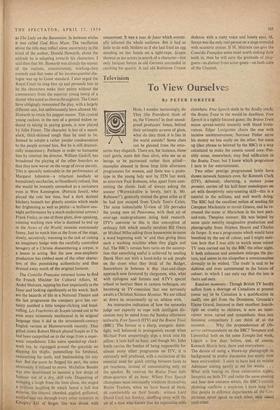Television
To View Ourselves
By PETER FORSTER How, I wonder increasingly, do They (the Providers) think of us, the Viewers? In their sound- proof producers' boxes, behind their antiseptic screens of glass, what do they think it is like in the world outside? Some clues can be gleaned from the emis- saries they dispatch. There are, for instance, those rairl gairls, more deb than alive, who see us as beings to be patronised rather than pitied— examples abound in those limp little afternoon programmes for women, and there was a. proto- type in the young lady sent by ITN last week to interview Paul Robeson, who, apart from com- mitting the classic fault of always asking the answer ('Warwickshire is lovely, isn't it, Mr. Robeson?'), generally treated the great artist as if he had just escaped from Uncle Tom's Cabin. The same indomitable U-view of life pervades the young men on Panorama, with their air of over-age undergraduates doing field research. ITV's converse to this is that conception of ordinary folk which usually involves Bill Owen or Michael Miles asking three housewives to name a word beginning with 'w' and then giving them each a washing machine when they giggle and fail. The BBC's version here turns on the assump- tion that something useful is achieved by sending Derek Hart out with a hand-mike to ask people on the street what they think of the Budget... Somewhere in between is that chat-and-chaps approach now favoured by clergymen, who, what with epilogues and forums and ATV's special school to instruct them in camera technique, are becoming so TV-conscious that one nervously awaits a Christian Science Monitor. We are talked at, down to, occasionally up to; seldom with.
An instructive indication of how the networks judge our capacity to cope with intelligent dis- cussion may be noted from the Sunday afternoon stalwarts, Free Speech (ITV) and the Brains Trust (BBC). The former is a sharp, energetic dorm- fight, well balanced in protagonists except when Michael'Foot unsportingly slips a brick into his pillow; it lasts half an hour, and though Mr. John Irwin carries the burden of being responsible for almost every other programme on ITV, it is extremely well produced, with a realisation of the essential need for quick cutting between faces to get reactions, instead of concentrating only on the speaker. By contrast the Brains Trust lasts three-quarters of an hour. Where Free Speech champions must continually vindicate themselves, Brains Trusters, when we have heard of them, sit comfortably on their laurels : witness Lord David Cecil last Sunday, Muffling away with the air of a man who knows that his reputation rests elsewhere. Free Speech deals in the deadly crack; the Brains Trust in the would-be deathless. Free Speech is a tightly focused game; the Brains Trust mixes spread-nozzle sincerity with bland irrele- vances. Edgar Lustgarten chairs the one with incisive unobtrusiveness; Norman Fisher earns his money no less easily on the other, but sums up (that phrase so beloved by the BBC) in a way caloulated to make the cosmic sound cosy. Pos- sibly some, somewhere, may find edification in the Brains Trust, but I know which programme I turn to for entertainment.
Two other prestige programmes lately have shown network honours even. Sir Kenneth Clark (ITV), debonair, charming, a mature jeune premier, carries off his half-hour monologues on art with deceptively easy-seeming skill—this is a tutorial to the millions, and well worth doing. The BBC had the excellent notion of sending Sir Compton Mackenzie to revisit Greece, and he re- created the scene at Marathon in his best port- and-nuts, Thespian manner. He was helped by some quite notably imaginative production and photography from Stephen Hearst and Charles de Jaeger. It was a programme which would have benefited by the use of colour, and I might men- tion here that I was able to watch some colour TV tests carried out by the BBC the other night. It both enhances and somehow enlarges the pic- ture, and seems to me altogether a consummation devoutly to be wished. 'The trade' is said to be dubious and even uninterested in the future of colour; to which I can only say that the loss is theirs and ours.
Random moments : Though British TV hardly suffers from a shortage of Canadians at present (some say to be Canadian is a qualification in itself), one girl from the Dominion, Granada's Elaine Grand, featured in their excellent Search- light on cruelty to children, is now an inter- viewer more varied and sympathetic than any feminine competitors I can think of at the moment. . . . Why the preponderance of Ob- server correspondents on the BBC? Sampson and Lowenthal both on the same Tonight last week, Legum a few days before, and, of course, Kenneth Harris here, there and everywhere. . . . The device of using a blown-up photograph as background to studio discussion has surely now been overworked : I seem to have had an outsize Adenauer staring nastily at me for weeks. . . . What with boxing on three consecutive nights, Semprini on both TV and radio the same evening and four new costume serials, the BBC's current planning confirms a suspicion I haVe long had that people in different departments of the Cor- poration never speak to each other, only about each other.


































 Previous page
Previous page